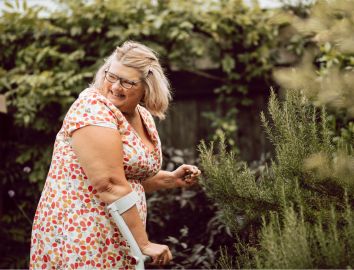
Anita Lowther was in her 40s when she injured her spinal cord. This led to a diagnosis of Cauda Equina Syndrome and bladder incontinence.
In this blog, Anita discusses the emotional value of peer-to-peer support, and just how vital those connections through lived experiences can be.
At the start of my injury, I felt alone. Being discharged from hospital with a rare condition that even as a nurse I had only heard of, I knew it was a medical emergency but had no idea of the outcomes or the impact on my life. Naturally, I started searching the web for information about Cauda Equina. Social media wasn’t really a thing back then, but I found a support group on AOL chat.
I had the physical support from my family—and their love. My friends and nursing colleagues were great, but I was desperate to find someone who had been through, or was going through the same experience. Reading research was helpful to a degree, but it lacked patient experiences and their journey.
I clearly remember typing how alone I felt, even though I had four sons and a husband at home with me. I felt alone in my head, and pain medication was not helping me to sort my thoughts so I could unpack them later. One night, I typed in BLOCK CAPITALS through my silent tears. One reply told me ‘not to shout!’, (because of the capitals), but another replied that they heard my tears and pain and that I had every reason to shout if I wanted. They were there with me.
This lady shared her journey with me, and we are still in contact 18 years on. Her words are like mine— from the heart, backed with experience and honesty. I can honestly say that this now rather primitive peer-to-peer support system saved my sanity.
The importance of peer-to-peer support
I’m an incredibly positive person, but finding myself in a world with a physical loss of function and emotionally draining thoughts of “when will I get better” or “will I actually get better” was totally new to me. The fact that I felt heard and understood, the sharing of experience and knowledge, helped me feel less alone in my head.
It’s never easy talking to strangers about personal loss of bodily function. It felt like a safe environment to ask the questions that were buzzing around in my mind. At a time when support was poor from the medical community, I waited for my post-op six week follow-up at the hospital, and my GP just gave me stronger pain meds. As lovely as she was, she had no experience of my condition.
The support group was available 24/7. Someone else was always online, and this is key. At that time of despair, you want someone who understands you, not six days, or weeks later. Equally, being part of the group meant that there was always someone who had felt, or had gone through what you were experiencing.

As I progressed in my own journey, I began to feel I had the knowledge and experience to help others. When you’re able to help someone else, it positively impacts your own sense of self-worth. Peer support can come in many forms. It might just be the “does anyone know X”, and everyone may have their opinion, but you then have the ability to make an informed choice on what you want to do, and whose answer to align with. You build relationships with others who offer solutions based on their experiences. This leads to trust.
I believe that we find our own tribe of friends who share our values and some shared experiences. This often leads to incredibly strong friendships.
“Act as if what you do makes a difference. It does.” —William James, American philosopher and psychologist.
How support comforted and empowered me
Eighteen years on, and I’m still in contact with four members across the world. We FaceTime, and chat like old friends. Their support, having experienced a journey similar to mine, gave me knowledge, encouragement, support, and comfort with real empathy.
From the small ‘top tips of how to self-catheterise‘, to suggestions for my bowels (for eighteen years I managed my bowels via rectal irrigation, but I now have a stoma), relationships, and more. It was always with a “have you thought of x or tried y?”.
Obviously, they would always recommend I spoke to a healthcare professional if possibly needed, but at 3am when it was tough, someone would listen and share their experience. Peer-to-peer support offers stronger emotional engagement backed with lived experience.
It’s where meaningful relationships are formed.
I invite you to join us for the Navigating Knowledge with Cauda Equina event on Thursday, 19th June at the Black Country Living Museum. This event is designed to provide practical support and education to people living with Cauda Equina Syndrome, focusing on empowerment, connection, and conversation.
I will be presenting at the event and will be available to chat, have a coffee, and help any nervous attendees feel at home among others living with Cauda Equina Syndrome. This is a wonderful opportunity to create meaningful connections of your own and start taking back control of your own life.
Don’t miss out on this chance to connect with others, share experiences, and learn from those who are living life on their own terms after Cauda Equina Syndrome. I look forward to seeing you there!
